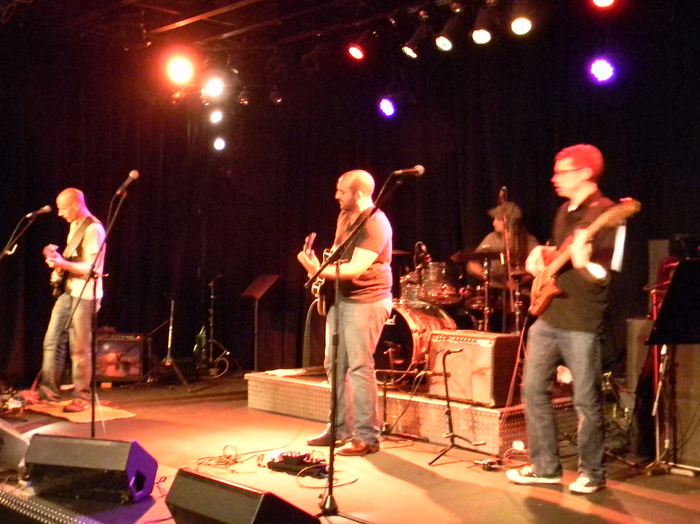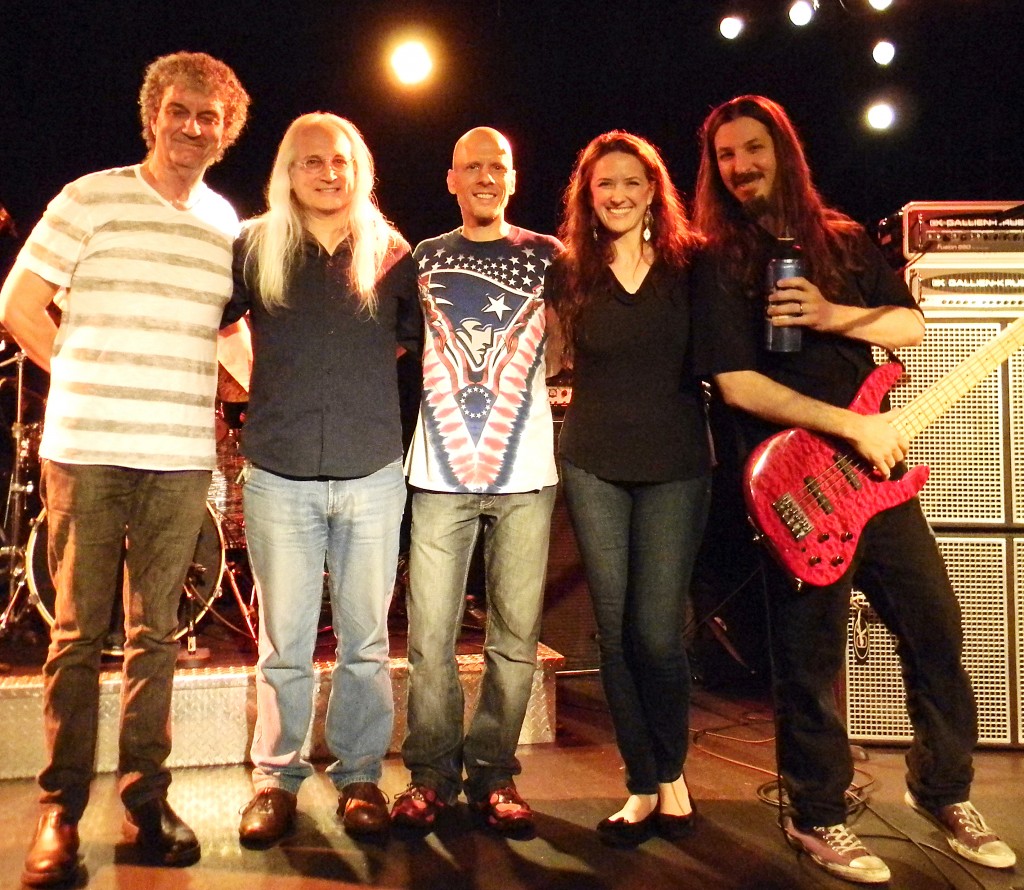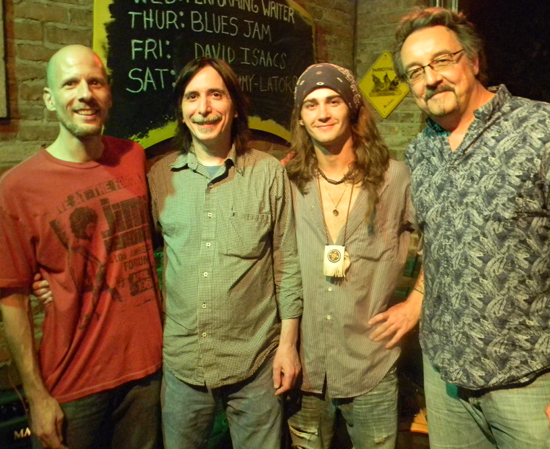blues
The Nashville Berklee Jam presents “Inside the Nashville Music Industry” with Eric Normand and Mike Chapman – August 26, 2013
As host of the Nashville Berklee Jam, the job of booking special guests at this bimonthly event has been an interesting one. The Nashville music industry is chock full of music industry insiders and this fact has yielded some great talks for us over the past year and half. During this time, I’ve been asked a few times to give one of these talks and on Monday, August 26 I decided to share my perspective. Earlier that month I had given an in-depth clinic about the Nashville music industry at the Berklee College of music in Boston, so a continuation of that theme seemed like the logical thing to do. I decided to take it one step further and enlisted the help of my friend and colleague, A-list session bassist, Mike Chapman.
I spoke first, giving a talk that was essentially an overview of the Nashville music industry. Much of this “street level perspective” of the music related jobs in Nashville was basically a condensed version of my book “The Nashville Musician’s Survival Guide”. After my talk, Mike gave a talk which covered some finer points about the recording industry side of Music City. Rather than elaborating on these discussions in a blog, I thought it would be more beneficial to simply share the following videos of these talks (special thanks to Jack Zander for filming, editing and posting the videos). For a different perspective, you can also check out this blog written by Berklee alum, Amanda Williams.
So here you go, videos of our talks and a few performances!
The Nashville Berklee Jam is held at The Rutledge on the last Monday of every other month, with the next event to take place on Monday, October 28 with special guest, performance coach, Diane Kimbrough. After Diane’s talk, she will be sticking around and offering free critiques and coaching to performers and jammers. Please e-mail me if you would like to take part in this part of the event. Or just show up and let me know that you are interested in participating, we’ll do our best to squeeze you in!
For more info about future events, please visit the Nashville Berklee Jam website NashvilleBerkleeJam.com
If you would like to learn more about the Nashville music industry, please check out my website and book “The Nashville Musician’s Survival Guide”.
Nashville Berklee Jam with Bryan Beller – April 29, 2013 – Videos
For those of you who missed our second Nashville Berklee Jam at the Rutledge, you missed quite a special night. Berklee alum and bassist for Steve Vai and Joe Satriani, Bryan Beller shared a fascinating story and some great insight, as well as a great performance with our house band and his wife, Kyra Small. Fortunately, we captured the whole evening on video (special thanks to Jack Zander for filming and video editing). Here are some highlights from this great night!
Bryan’s Talk
“Mercy, Mercy, Mercy” performed by Bryan Beller and the house band
“Signed, Sealed, Delivered” performed by Bryan & the house band, vocals by Kyra Small
“Cissy Strut” performed by Bryan Bller and the house band
“Ain’t No Sunshine” performed by Bryan & the house band, vocals by Kyra Small
Here are some links to performances from the jam portion of this event:
The Nashville Berklee Jam is held at The Rutledge on the last Monday of every other month, with the next event to take place on Monday, October 28 with special guest, performance coach, Diane Kimbrough.
For more info about future events, please visit the Nashville Berklee Jam website NashvilleBerkleeJam.com
If you would like to learn more about the Nashville music industry, please check out my website and book “The Nashville Musician’s Survival Guide”.
A-list bassist and Union President, Dave Pomeroy speaks at the Nashville Berklee Jam; June 24, 2013
by Eric Normand
Long before recording with artists like Emmy Lou Harris, Alison Krauss, and Peter Frampton, Nashville Musicians Union President and our guest speaker on this night, Dave Pomeroy was learning how to play the standup bass in a school orchestra in Virginia. Growing up as the son of a military man, Dave experienced life in a few different places and also learned how to play the electric bass before eventually permanently relocating to Nashville in 1977. Following a musical heart inspired by the British Invasion, his foray into the world of the fretless bass would eventually come full circle when his skills landed him session work with Keith Whitley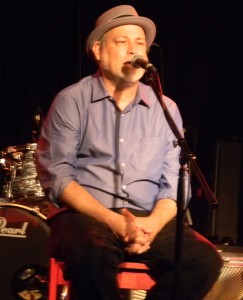 and Trisha Yearwood many years later.
and Trisha Yearwood many years later.
The road that led to A-team session work in the Nashville studio scene of the 80’s and 90’s was filled with a plethora of life and music enriching experiences. Working with the legendary Don Williams from 1980 to 1994 was a “journey into minimalism” which ultimately taught him the power of the song. Under the wing of this world-class songwriter and performer, Dave learned how to become a great songwriter, studio musician and producer in his own right.
“Don changed my life… these are all things he taught me, just by example and by encouraging me and giving me respect…”
A key moment in Dave’s life came 10 days after he finished recording on Keith Whitley’s fourth album, when the legendary singer died suddenly of an alcohol overdose.
“…It really shook me up and I realized that I was not at a good place in my life, I needed to change some things and make myself a happy person…it really did change my life and made me realize that life is precious and you better get on with what you’re trying to do…”
Dave continued on as an in-demand session player, his work with Keith Whitley ultimately leading to recording the bass tracks on Trisha Yearwood’s first seven albums as well as countless other major-label projects.
“One of the lessons that I really want to impart is that you have to listen to your inner voice when it talks to you, because if you don’t, it will stop talking…”
He joined the Nashville Musicians Union, AFM Local 257 in 1978, gradually becoming more and more involved in the years that followed. As the years rolled by he became frustrated with the status quo of the Union, feeling there was a growing “disconnect between players and leadership”. In 2008 he ran for union president and won the election. Dave shared that the Musicians Union has totally changed, both here and nationally and spoke about its role in regards to the rights of the individual musician.
“It’s really about trying to spread the word that it’s okay to take care of business, and not all musicians are good at that…in this day and age, if you don’t protect yourself who’s going to? If the Musicians Union doesn’t have your back, it’s you against the music business, good luck with that, it works for some people, but at the same time it’s good to know that there are resources and that you do have something you can fall back on.”
One of his roles as union president is fighting for musician and songwriter rights to be paid for their work, and the reality of digital piracy.
“We’ve been through this terrible thing with digital piracy… it really just decimated the way things were. But now we’re starting to see that people are actually understanding that it’s not that big of a deal to spend $1.29 or $.99 to buy a song instead of stealing it, and that if you want to have a music business in the future it may not be there if you’re not willing to pay for stuff…it’s okay to be a consumer, it’s okay to be a fan, I’m still a fan.”
Near the end of Dave’s talk he shared a few pieces of advice one can only learn from a lifetime of pursuits in the music business:
- Take nothing for granted
- Don’t be afraid to ask questions
- There are no stupid questions
- Strive to play with players who are better than you
- Be honest with yourself
- Be a nice person, nobody wants to work with a jerk
- Don’t take it personal if you don’t get the call
- Owning your own stuff is the way of the future
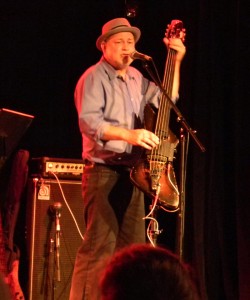 After some questions and answers Dave played a brief set of original solo material using a very unique approach. Tying into his theme of “individual entrepreneurship in a changing music scene” he used two basses, one on a stand and one he wore around his neck to create loops on the fly using a loop machine. He then sang tunes over the loop accompanying his performance on the second bass by playing secondary parts, fills and solos. It was an inspired performance that everyone seemed to thoroughly enjoy.
After some questions and answers Dave played a brief set of original solo material using a very unique approach. Tying into his theme of “individual entrepreneurship in a changing music scene” he used two basses, one on a stand and one he wore around his neck to create loops on the fly using a loop machine. He then sang tunes over the loop accompanying his performance on the second bass by playing secondary parts, fills and solos. It was an inspired performance that everyone seemed to thoroughly enjoy.
His portion of the night concluded, and the open jam began featuring a combination of Berklee alumni and others from the Nashville music community. The jam covered a lot of ground, everything from blues jams to original songs by some up-and-coming Nashville songwriters.
I would like to extend a big thank you to Dave Pomeroy for sharing his wisdom and music, Jack Zander for videotaping this event, The Rutledge, Berklee alumni volunteers Shantell Ogden, Heston Alley, Blake Branch, and everyone else who came out for this event. See you at the next one!
The Nashville Berklee Jam is held at The Rutledge on the last Monday of every other month, with the next event to take place on Monday, August 26 when I will be giving a talk about navigating the Nashville Music Industry
For more info about future events, please visit the Nashville Berklee Jam website NashvilleBerkleeJam.com
If you would like to learn more about the Nashville music industry, please check out my website and book “The Nashville Musician’s Survival Guide”.
Nashville Berklee Jam with Bryan Beller – April 29, 2013
By Eric Normand
Our second installment of The Nashville Berklee Jam at The Rutledge brought out a great crowd, an inspiring story, and some “vibey” performances. Our special guest on this night, bass extraordinaire and Berklee alum, Bryan Beller gave an insightful talk that touched on the ups and downs of his life and his experiences in the music business.
Long before his recent work with Steve Vai, Dethklok, The Aristocrats, and his current role as bassist on Joe Satriani’s 2013 European tour, Bryan roamed the halls of 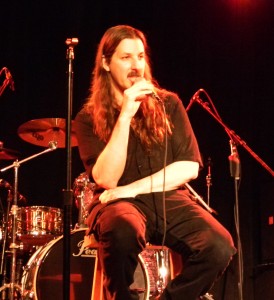 Berklee College of Music searching for a higher level of musical awareness and his place in the world of music. This journey would take him to LA and a stint with the Dweezil Zappa band, a move that led to an interesting chain of events.
Berklee College of Music searching for a higher level of musical awareness and his place in the world of music. This journey would take him to LA and a stint with the Dweezil Zappa band, a move that led to an interesting chain of events.
A few years into his new life on the West Coast he found himself in a once-in-a-lifetime opportunity auditioning for the bass spot with Steve Vai, a dream gig that ultimately slipped away. He candidly shared his story of the ups and downs of life as a musician in LA, and what started out as a musical journey eventually led to the golden handcuffs of corporate America when he wound up VP of the bass amplifier company, SWR, an experience that taught him much about the business world.
Eventually, SWR was bought out by Fender, a merger that Bryan helped coordinate, and while this turned out to be financially rewarding, his job title proved much more happening than the gig itself. Bryan eventually left corporate America to give his musical aspirations another shot, moving to Nashville to start a new chapter. No sooner had he landed in Music City when he found himself in a parallel universe, auditioning a second time for the Steve Vai bass job. This time, 11 years after his first attempt, he landed the gig.
The unexpected gig with Vai began a whole new chapter, one that is continuing to write itself as we speak. Of his experiences of delving between corporate life and the music business, Bryan explained:
“No choice is as permanent as it seems when you’re making it”, and “Whatever it is you want to do, leave open the possibility that it might happen.”
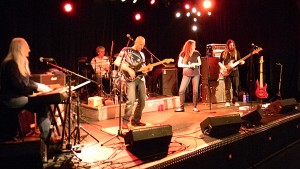 Bryan’s talk concluded with some questions and answers followed by a brief set with the house band. We jammed on some R&B instrumentals and also featured Bryan’s wife, Kira Small who delivered a passionate, vocal performance. The open jam that followed featured several alums, all who delivered inspiring performances. Follow this link to watch a video of Bryan’s talk (one hour). Video excerpts of performances from this night will be posted in another blog.
Bryan’s talk concluded with some questions and answers followed by a brief set with the house band. We jammed on some R&B instrumentals and also featured Bryan’s wife, Kira Small who delivered a passionate, vocal performance. The open jam that followed featured several alums, all who delivered inspiring performances. Follow this link to watch a video of Bryan’s talk (one hour). Video excerpts of performances from this night will be posted in another blog.
Special thanks to Bryan and Kyra for making this event a big success; The Rutledge; alums, Amanda Williams and Arielle Schwaim; videographer, Jack Zander, and Fran Breen (drums) and Eric Bikales (keys) for donating their time.
The Nashville Berklee Jam is held at The Rutledge on the last Monday of every other month, with the next event to take place on Monday, June 24 featuring special guest, President of the Nashville Musician’s Union and A-list bassist, Dave Pomeroy
For more info about future events, please visit the Nashville Berklee Jam website NashvilleBerkleeJam.com
If you would like to learn more about the Nashville music industry, please check out my website and book “The Nashville Musician’s Survival Guide”.
Nashville Berklee Jam with Dallas Davidson – February 18, 2013 – Part II
By Eric Normand
We were only halfway through our very first Nashville Berklee Jam at The Rutledge and those in attendance had received some amazing perspective, and enjoyed an inspired performance from one of Nashville’s top songwriters, Dallas Davidson. After Dallas’s portion of the night was 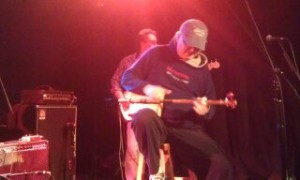 over we took a moment to reorganize and then began the open jam portion of this night.
over we took a moment to reorganize and then began the open jam portion of this night.
Among those who performed were alums, Amanda Williams (also one of the organizers of this event), Mason Stevens, who played a Delta blues instrument known as the “Diddly Bo”, drummers, John Rodrigue and Russell Garner, and bassist, Austin Solomon (Austin took a means solo in Cissy Strut). A few others from the Nashville music community also sat in on drums, Austin Marshall and Tom Drenon.
All the performances were strong and everyone who participated had a great time, but don’t take my word for it, check out the videos below to get a better idea of what can happen at The Nashville Berklee Jam!
The Nashville Berklee Jam is held at The Rutledge on the last Monday of every other month, with the next event to take place on Monday, April 29 featuring special guest, Bassist, Bryan Beller (Joe Satriani, Steve Vai, Mike Keneally) who will also be joined by his wife, Kira Small.
For more info about future events, please visit the Nashville Berklee Jam website NashvilleBerkleeJam.com
If you would like to learn more about the Nashville music industry, please check out my website and book “The Nashville Musician’s Survival Guide”.
Jack Pearson at the Nashville Berklee Jam – August 14, 2011
Guitarist, singer, songwriter, producer and session-musician, Jack Pearson shared some unique perspective about his musical journey with a room full of Berklee alumni and others from the Nashville music community last Tuesday. The Nashville Berklee Jam, held monthly at the Fillin’ Station in Kingston Springs, saw some new faces and old friends on this special night, and Jack’s decades of experience as a world-class musician provided a rare peek behind the curtain for all those in attendance.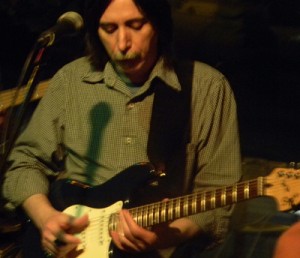
Jack’s musical career began in the mid 1970’s, when he played in multiple bands and logged his first recording session at age 16. In 1993 the Nashville native began his relationship with The Allman Brothers Band as a sub for Dickey Betts, eventually becoming a member of the ABB from 1997-1999 and also touring with Gregg Allman & Friends. Over the years he’s also worked with Vince Gill, Delbert McClinton, Jimmy Buffett, Earl Scruggs, Bobby “Blue” Bland, Amy Grant, Faith Hill, Gov’t Mule, Buddy DeFranco, and countless others.
Jack began his part of this night by playing some beautiful sketches of “I Can’t Get Started”, and for those who have never heard him play, his ability to transport an audience through time and space with nothing other than an unaccompanied electric guitar became quickly apparent. Following the spontaneous applause, Jack cut straight to some Q & A. One of the first questions asked was about his guitar, and I found it interesting that the deep, rich tone coming out of our backline Fender Deluxe originated from a Fender “Squire” Stratocaster, which he had recently bought for $100 at a pawn shop. Plugged into nothing other than a lone tube screamer, this drove home the point that great tone comes from within.
Learning from his oldest brother, Jack was exposed to rockabilly and blues as a teenager and explored the music of Chuck Berry, The Ventures, and Carl Perkins at a young age before eventually discovering jazz greats like, Wes Montgomery, Django Reinhardt, and Charlie Christian. Learning from friends, other musicians, and records, he slowly pieced together his musical vocabulary. He shared some thoughts on how to approach a II-V turnaround, demonstrating some different voicings and melodic approaches, underscoring the importance of putting song and melody above the technical understanding of modes and scales.
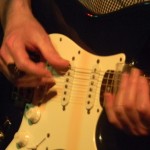 “It takes a lot of experimenting… a lot of guys come to me that get out of school and they say, “when I hear this chord I’m supposed to play this mode and scale”, and it locks them up. They can’t make any melodies because they’re told to play a mode or a scale.”
“It takes a lot of experimenting… a lot of guys come to me that get out of school and they say, “when I hear this chord I’m supposed to play this mode and scale”, and it locks them up. They can’t make any melodies because they’re told to play a mode or a scale.”
This simple, but prophetic thought resonated, and I had flashes to a time in my life when I over analyzed the music I played. Jack drove this point home with “…it comes down to the chord and the melody and where it’s going to…”
He went on to talk about the blending of styles and how he went through different periods of his life where he would be deeply immersed in a singular style for a few years – Delta blues, jazz, etc., and that after a while, all these different styles started coming together. Not afraid to take some chances musically, he demonstrated how he might go from a Howlin’ Wolf lick to a Charlie Parker lick within the same phrase, and that while some players will say this is wrong, he believes that “the main thing is to get the music out, and play with feeling.”
In response to a question about some of his best and worst gigs, Jack said that some of the worst gigs are when people don’t listen, and the music that you play with somebody is more important than the venue, or how famous somebody is.
He explained how learning all of the Allman Brothers songs as a kid helped put him in the position to sub for Dickey Betts on an early 90s Allman Brothers tour, which led to some recording with Gregg Allman and eventually to a phone call from Greg in which he was asked if he wanted to join the Allman Brothers band.
He candidly shared how this landmark gig damaged his hearing, causing an already existing case of Tinnitus to worsen, ultimately forcing him to leave the gig, perhaps sooner than he otherwise would have.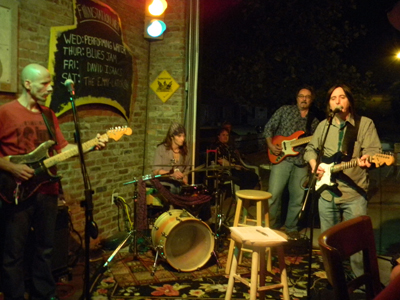
“There’s really no way to describe how loud it was on stage…Dickey Betts wasn’t in the PA…he was 135 dB side stage…”
As a fellow tinnitus sufferer I completely related to this portion of his talk and gained some new perspective as he explained that, despite wearing earplugs, extreme SPL’s (sound pressure levels) can still do damage, as the sound can affect your inner ear by entering your nose, mouth, and through your bones.
In response to a question about life lessons learned through music he answered, “Try not to take music for granted, it’s so special, and you can reach so many people…lyrics can encourage you, relate to your pain, but you can also do it with notes.” He demonstrated this by showing how the same group of notes can sound happy, or sad depending on where the emphasis is placed. He talked about the endless possibilities of how you can play even a single note, demonstrating this concept by playing a huge range of variances on a high “G” note.
After Jack’s talk concluded he played a short set with our Alumni House Band, the air becoming filled with the sounds of spontaneous applause after each inspired performance. Jack left shortly after his set, and the other alums in attendance continued jamming into the night. I, and everyone else in attendance would like to extend our appreciation and gratitude to Jack for sharing his music and journey on this special night!
Our next Nashville Berklee Jam will feature country music artist and hit-songwriter, Rhett Akins on Tuesday, September 11 at The Fillin’ Station. For more info, go to www.nashvilleberkleejam.com.
The Nashville Berklee Jam Goes Public
Today I want to tell you all about an exciting monthly event I have been hosting – The Nashville Berklee Jam, and its new accessibility to everyone in the Nashville music community. The beginnings of this idea came to me a few years ago when I first attended the annual Nashville Berklee Alumni Reception. On my way home that night, I remember thinking how great it was to meet so many musicians in one night who were so passionate about their musical ambitions and so hungry for knowledge. These musical comrades were a mix of Berklee alumni residing in middle Tennessee and Berklee students who came down for the annual Nashville field trip. At this reception I made connections with other like-minded alums and students who came down on the field trip, the latter peppering me with questions about my experiences in Music City. This event was a very stimulating night as the energy of three hundred musical minds meeting and conversing seemed to create an air of camaraderie and untapped potential! Then I went home and another year passed before I got this fix again.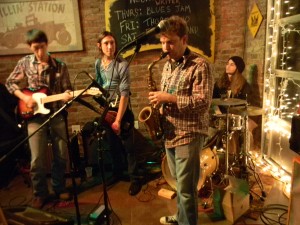
So this past winter I decided to create a monthly event to try to emulate this musical networking hoedown on a smaller scale, and The Nashville Berklee Jam was born. Held on the first or second Tuesday of the month from 7 PM to 11 PM at The Fillin’ Station in Kingston Springs, TN, these events start out with an informal meet and greet, followed by a Nashville music industry guest speaker, and end with an open jam. So far the reception has been very positive, here’s a recap (with links to their corresponding blogs):
February – A-list session bassist, Mike Chapman gave a great talk about being a session musician, outlining key concepts in what he calls, “the essential slices of the session player pizza”. He also jammed with several alums after the talk.
March – award-winning vocal coach, producer, and hit songwriter, Judy Rodman gave an insightful talk about career paths for vocalists. She also performed a couple of songs with the house band and then critiqued and coached several vocal performances, helping vocalists make instant improvements.
April – Stevie Ray Vaughan keyboardist, Reese Wynans shared his fascinating story about being a lifelong-career musician, the life-changing moment that came on his last night with Delbert McClinton that landed him the SRV gig, and the whirlwind years that followed. After his talk, he joined us for a few inspired performances.
May – fellow alum, musician, and author of “The Nashville Number System”, Chas Williams gave an introductory class on this subject. After the class, he charted one of alum, Sarah Tollerson’s originals and performed it with Sarah and the house band with everybody reading the chart off a dry erase board.
June – drummer, producer, and clinician, Rich Redmond gave an inspiring talk on “Navigating the Nashville Music Industry” speaking candidly about his early “lean years” in Music City and different approaches to finding success here. After his talk he sat in for a few tunes and stuck around to chat with others in attendance.
For our next event, to be held on Tuesday, July 10, I will be giving a talk that continues last month’s theme – “Navigating the Nashville Music Industry – Part Two”, during which I will explore some of the concepts I write about in my book “The Nashville Musician’s Survival Guide”. And, this just in, for our event in August we are proud to announce that the guest speaker/performer will be none other than Nashville guitar ace, Jack Pearson, formerly of the Allman Brothers, Vince Gill and many others.
All of the guest speakers have given great talks, sharing their knowledge and providing inspiration, and these talks have been interactive with many great questions and comments from alums. My band, Skinny Buddha (comprised of Berklee alumni and others from the Nashville music community) provides backline and a starting point for the laid back jams which have covered everything from originals to classic rock to blues tunes to two-chord jams. All of these events have been great friendship building and networking experiences for all involved, as well as educational. So far, the attendance has been mostly comprised of Berklee alumni, but as there seems to be a growing interest from others in Nashville, we are now officially making this event open to the Public. Nashville is a diverse and complex music community in which a Berklee alumni community also resides, and it is my goal to help these two worlds intersect and meld together.
So come on out to our next “Nashville Berklee Jam” On Tuesday, July 10. I hope to see you there!
P.S. if you have any comments, thoughts, or questions, please feel free to e-mail me at eric@ericnormand.com
Stevie Ray Vaughan keyboardist, Reese Wynans talks at Nashville Berklee Jam
Some of my earliest childhood memories are of my dad playing records and, dare I say, reel to reel tapes of the music of Paul Butterfield, John Lee Hooker, Santana, and Derek and the Dominoes. I guess this music made an impression, because by my early teens in the early 1980’s I was buying my own records, not of the pop-based FM radio music of my generation, but of the previous generations more blues-based artists. While everyone else was listening to E.L.O. and Michael Jackson, I was discovering Jimi Hendrix, the Allman Brothers, BB King and Bobby Bland. Sure, I liked some of the 80’s guitar rock of the day, but always kept digging back to a more rootsy sound. Then right smack in the middle of 80’s hair band mania came Stevie Ray Vaughan, and I immediately related to his music.
Stevie’s music influenced a generation of guitarists and, at a moment where rock and pop music was winding itself up, almost single-handedly brought blues music back into the light. You couldn’t go see a club band during the late 80’s and early 90’s without hearing his music. I found myself covering his renditions of blues classics like “The Sky Is Cryin’”, “Empty Arms”, as well as originals like “Cold Shot” and “Walkin’ the Tightrope”, as did many others at that time. Stevie’s instrumental “Riviera Paradise” from the album ‘In Step’ is a beautiful piece of American roots music, and I always loved the spooky vibe created by his magical band on that song in particular.
I’ll never forget the day I heard of his tragic passing, how sad it was that we had to lose such a wonderful artist at such a young age. But his music, and the influence of his music, lives on, and I, like many others, will always appreciate everything Stevie did for music, and everything his music has done for the world.
So that’s why when I began hosting the Nashville Berklee Jam I felt compelled to 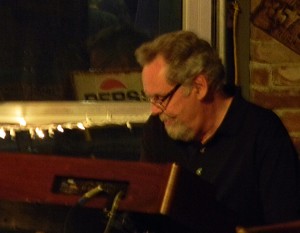 have Reese Wynans, the keyboardist who played with Stevie for the last five years of the great guitarist’s life, as a special guest speaker/performer. Reese was kind enough to share his story with me and a room full of alums at our monthly Nashville Berklee Jam last Tuesday at The Fillin’ Station.
have Reese Wynans, the keyboardist who played with Stevie for the last five years of the great guitarist’s life, as a special guest speaker/performer. Reese was kind enough to share his story with me and a room full of alums at our monthly Nashville Berklee Jam last Tuesday at The Fillin’ Station.
Almost 20 years before he began working with SRV he was playing in cover bands in his home state of Florida, and he recounted one of his first bands playing five sets a night, six nights a week. Two of the other members were Dickey Betts and Berry Oakley and on their one day off they would play a weekly free jam, adding Duane Allman and Butch Trucks to the mix. Eventually Duane decided to start his own band and stole these key members to form The Allman Brothers.
After spending a few years in San Francisco and working with a still-unknown artist at this time, Boz Scaggs, he returned to Florida for a brief period and then worked the East Coast in a show band for a few years. Reese then migrated to Austin, Texas, a booming town full of blues-infused music by this point of the mid-70s. Of this time, Reese spoke passionately.
“It was really great for me living in Austin…everything was so rootsy…they had a great music scene back there in the 70’s. They had a great blues scene, and a great blues club called ‘Antone’s’…and I would go and sit in at Antone’s anytime I had a chance. I was ending up really lovin’ the blues during this time.”
By 1980 he found himself working for Delbert McClinton, playing on four of his records and touring extensively for the next five years. By 1985, Reese was ready to get off the road, and would have if not for a fateful encounter at the end of his final gig with Delbert. Apparently, Delbert’s sax player had been invited to play on one song of a Stevie Ray Vaughan recording session after Delbert’s concert, and at the last minute Reese was asked to join in as the other keyboardist did not show up. Things went very well at this particular recording session, one which produced the hit, “Look at Little Sister” and Reese was asked to come back and record the following day. By the end of that recording session he was asked if he wanted to join the band. Reese summed up a life lesson from this critical moment,
“When a door opens for you, you’ve got to be willing to walk through it, and then be able to deliver once you get through there.”
The next five years would yield three Grammys, several world tours, and a reintroduction of the blues to the masses –
“We were spokesman for Texas blues…as much as Stevie didn’t want to, BB King had to open for us, because we were just more popular than him. He said “no we can never, BB’s always closing the show”… but finally, we had to headline…I loved playing in that band…we were all totally immersed in the blues, and we felt like were the vanguard of the blues. We were dragging Buddy Guy and Otis Rush into the light and presenting them out on our shows to people who were just hungry for that music…the stuff that we played I thought was shining a light on all the huge blues guitar players that had come before us, and that was a wonderful thing to do, I felt like it was really worthwhile.”
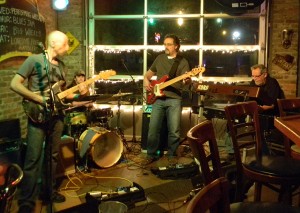 After Stevie’s tragic passing, Reese wound up in Nashville, TN, a place where he has continued to record and perform on a national level. During the talk, Reese passed around his All Music Discography, which reveals a staggering body of work, including Brooks and Dunn’s 2006 single of the year “Believe”. He offered us some thoughts about the differences between studio and live performance –
After Stevie’s tragic passing, Reese wound up in Nashville, TN, a place where he has continued to record and perform on a national level. During the talk, Reese passed around his All Music Discography, which reveals a staggering body of work, including Brooks and Dunn’s 2006 single of the year “Believe”. He offered us some thoughts about the differences between studio and live performance –
“I like being in the studio, I like playing gigs, I like playing clubs…all you people who do studio work know it’s two different things. Playing a club is really a chance to experiment…a chance to reach out in different directions and really find yourself. The studio isn’t really a place for that. The studio is where you don’t have to play it safe, but you’ve got to do something that’s exactly right for the 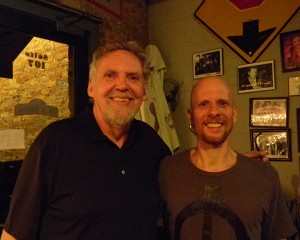 song…it’s a place for finding something that works, finding something unique that works.”
song…it’s a place for finding something that works, finding something unique that works.”
After his talk was finished, Reese was gracious enough to perform a set with our house band – a performance that was nothing short of inspired. I’ve heard his playing on many records, but there’s something intangible that you can feel in the heat of live performance that goes beyond a recording, and that was evident on this night. One of the songs we played together was “Little Wing”, a song that he had played on tour with Stevie, back in the day. On this song, Reese seemed to really stretch out in one of those magical musical moments in which time seems to stand still (see video below).
Eventually, this special night had to end, and we said goodbye after a quick photo op. Thanks, Reese, for sharing your wisdom, and for continuing to shine some light on that crown jewel of American music we call the blues.

